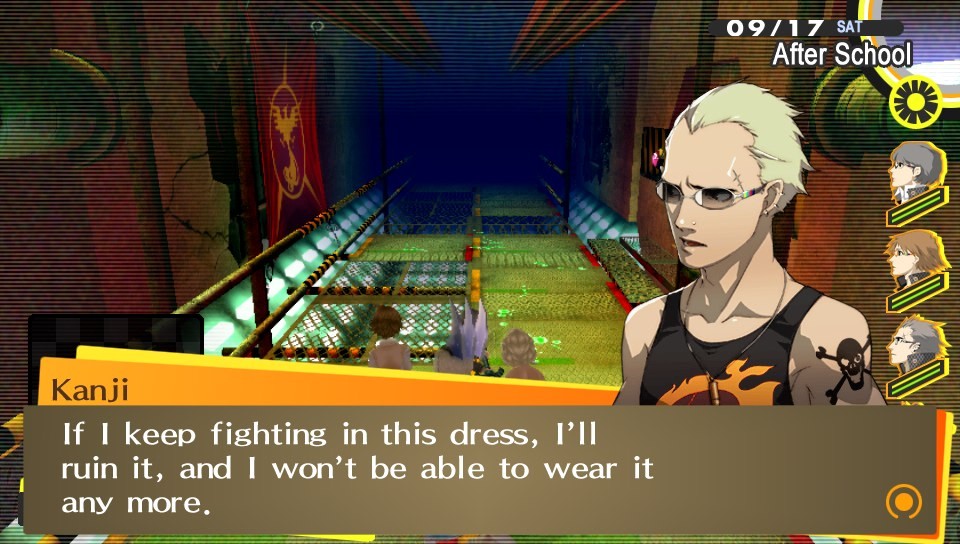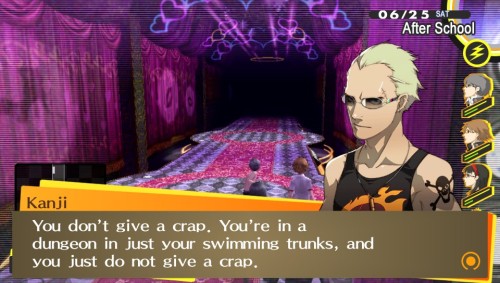WARNING: This contains spoilers for Persona 4!
Persona 4 is a curious game. I don't doubt the intentions of the writers might have been good; but it's a good example of good intentions being hampered by how something actually turned out.
The plot of the game is thus: Every night on a rainy day, a mysterious channel can be watched on TV, called the Midnight Channel by the characters in the game. Usually the programming is a little more than TVY-7, and anyone who gets seen on the midnight channel is usually dead shortly thereafter.
What kickstarts this all into motion is the main party discovering they can enter the world of the midnight channel by 'entering' a television. The worlds held within the Midnight Channel are often dark reflections of the character 'trapped' there's inner psyche, or, if you want to call it that, Persona.
The plot of the game is structured almost like a televised murder drama, carrying forward on a day-to-day basis mostly similar to the structure that was introduced in Persona 3.
Each arc is usually spent trying to balance grinding characters in The Midnight Channel while balancing social duties, made a little bit more stressful because there are immediate chances for failure if you aren't able to save someone in time.
Usually, saving someone involves some invested storytelling detailing how they're not necessarily who they choose to be. The interactions follow a very simple format: usually, as soon as someone is shown on the midnight channel, the rest of the school talks about it during the days following. Usually, it's to the tone of 'x person can't possibly be a miserable self loathing piece of shit' which I guess if one of my friends appeared naked on TV saying they hated everyone, I probably wouldn't believe it either.
I'd like to think my friends know me well enough that if it was me, they'd probably just shrug their shoulders.
You can tell from most of these scenes that the planners behind the game wanted it as a way to showcase character development, and reveal some 'inner truth's' about the rest of the cast so that the player might feel closer to them.
Persona 4 is pretty evident of one of the biggest phenomena that happens not just in videogames, but comic books too. The story and it's interactions hold up and present perfectly, as long as they exist examined. What's bad about the way Persona 4 is generally plotted, and the way all of the interactions happen, is that the second they're scrutinized they begin to fall apart, and even in some cases, become problematic.
The characters of Kanji Tatsumi and Naoto Shirogane have been pretty divisive. On one hand, both characters fall into a paradigm that the internet has taken to as being "Kawaii as fuckin' hell"
Kanji is even one of my favorite characters in the game; despite the fact that the entire cast is Goofy As Hell (if this we're a movie, it would be An Extremely Goofy Movie)
Kanji's trademark macho-boisterousness feels the right kind of out of place with everyone else's Anime Teen act of either being mopey as hell or completely loud and obnoxious, talkin to you Satonaka.
His character arc is essentially that the macho-tough-guy facade is a bit of a put on. Deep down, Kanji enjoys traditionally 'feminine' things like sewing and stuffed animals.
Indeed, most of Kanji's storyline is spent juxtaposing his macho exterior with his more sensitive nature. It all comes to head when Kanji Tatsumi is eventually the next person shown on the midnight channel - and the next victim.
Kanji's dungeon takes place in a steamy bathhouse, and in his midnight channel appearances he's all nude and oily like a Hakan cosplayer without the red greasepaint.
Kanji's story is that he's repressing his true nature - much like the other characters in the game.
How this is presented though, is entirely unique to Kanji - he's the only character who's psychosis is so linked to sexuality and seemingly sexual expression, even more than another character who's inner self has to deal with the prevalence of gender, Naoto Shirogane.
Yet even when Kanji's story is completed, he seemingly reverts to the exact same character he was before. That's actually kind of a problem with almost everybody in the game, really - but Kanji's magnifies it because of the subject matter of his inner Persona.
The game's message becomes perverted when you start to examine it closely and scrutinize it; it slowly erodes and becomes a reflection of what the developers intended.
Like a bad aesop on a TV sitcom, the message almost becomes that it's better to keep who you really are hidden and pushed away, because your friends may not like the 'real' you.
Looking at the reaction of the cast to Yosuke's true Persona - that he's a bit of a self-hating jerk with a bit of a superiority complex writes it on the wall pretty effectively, yet they react favorably to other characters 'real' selves.
Dang, that's pretty messed up! You can use the term problematic or whatever, but the reason I chose Kanji to make the observation was not just his role as my favorite character, but again the fact that he's one of the few characters who's Persona is tied into a concept of sexual identity, making the aesop of the game a little more damned.
Above all else, that inconsistency between the tone of the game and the writing of the game is what
continues to leverage games like Persona 4 more towards the 'good videogame writing' category, and why I think no matter how many deep concepts the developers throw in there, we're still stuck in a world where the best videogame writing is still worse than daytime television.
Kanji's change isn't ever really reflected at all besides him being more open to announce that he likes things that are traditionally non-masculine, but who he is as a character never changes.
Persona 4 never even goes to a length to clarify his sexuality - any time it's brought up it's usually for the point of making other characters uncomfortable or the punchline for a joke.
What's the deal with that, huh? The developers chalked it up to 'cultural differences' but I don't think anyone buys that for a second.



No comments:
Post a Comment